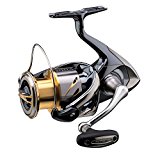Rock Bass Reproduction Fishing Facts and Information
Rock Bass are not very large. While the largest one on record reaches about 3.5 pounds, most in lakes and rivers can be found between three-quarters of a pound to 1.5 pounds.
Like other members of the sunfish family, rock bass spawn in shallow water when the spring water temperature reaches between 60°F to 70°F/15°C to 21°C and their spawning cycle matches that of the smallmouth bass. The male builds a circular nest eight to ten inches in diameter. It uses its tail for clearing away debris.
One or many female Rock Bass may deposits as many as 5,000 eggs into the nest, which the male quickly fertilizes. The male guards the eggs until they hatch three or four days later. A few days later, the hatched fry move into shallow, protected vegetated areas.
Once the fry have hatched, the young Rock Bass are found only in quiet water areas protected from waves and strong current. In their first year, they grow to two inches, as much as four inches in the second year before reaching seven inches in the third year.
Food Preference during Mating
The male Rock Bass will not eat during spawning and once the fry emerge from the eggs, they will protect them for a few weeks before eating again. However, it is still possible to catch them during the spring spawning season because of their instinct to defend their territory and their offspring. The male can be provoked to strike out of anger if the lure or bait comes within reach of the nest or the fry. Any bait or small lure will prove successful during spawning if you cast towards where they are nesting. The female is chassed off and can be caught in all the regular places that offer cover like docks and rock piles.
Line Strength
Rock Bass are not very large. While the largest one on record reaches about 3.5 pounds, most in lakes and rivers can be found between three-quarters of a pound to 1.5 pounds. And while a bass, they do not fight as much as the Smallmouth Bass. A good line strength is a six pound or an eight pound test line.
Rod and Reel
For most anglers, the Rock Bass is not the desired fish and is often caught when they are fishing for perch and they have chosen a bait or lure too small for the desired fish such as a Largemouth Bass.


